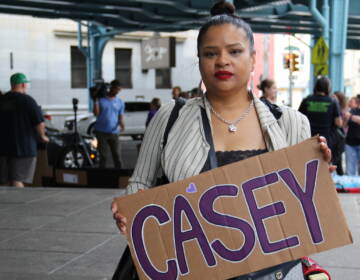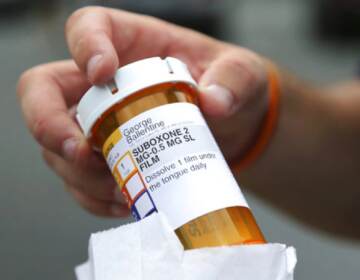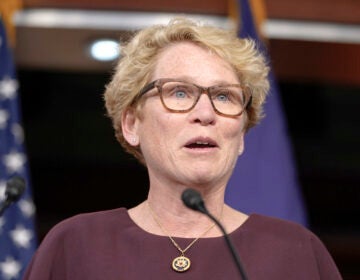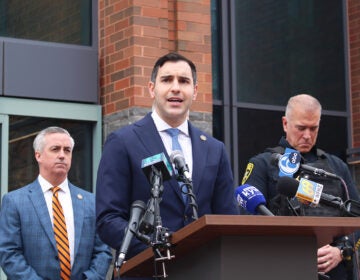Pennsylvania to get $148 million next year in payouts from 2nd wave of national opioid lawsuit settlements
The new payouts are from a second wave of national opioid lawsuit settlements with Teva, Allergan, CVS, Walgreens, and Walmart.
Listen 1:20
File photo: Jayde Newton helps to set up cardboard gravestones with the names of victims of opioid abuse outside the courthouse where the Purdue Pharma bankruptcy is taking place in White Plains, N.Y., on Aug. 9, 2021. (AP Photo/Seth Wenig, File)
Pennsylvania can expect to receive as much as $148 million in first-year payouts from a second wave of national lawsuit settlements related to the opioid and addiction crisis.
Deals were reached with suing states, cities, municipalities, and other parties that accused drug manufacturers Teva and Allergan and major pharmacy chains CVS, Walgreens, and Walmart of contributing to the opioid addiction epidemic and related overdose deaths.
Neil Mara, deputy chief attorney general of special litigation at the Pennsylvania Attorney General’s Office, said money from the newest settlements could be distributed as early as next year.
However, the payout amounts and timelines depend on final court approval, Mara told members of the Pennsylvania Opioid Misuse and Addiction Abatement Trust Thursday.
“We don’t anticipate problems obtaining court approval,” Mara said. “But the court approval is the triggering mechanism to allow the process of those payments to move forward.”
The trust, which is operated by 13 members that make up its board of trustees, is responsible for overseeing the state’s opioid settlement funds and spending.
Payouts to state and local governments from a first wave of national settlements with drug distributors McKesson, Cardinal Health, and AmerisourceBergen, and manufacturer Johnson & Johnson, began earlier this year.
About $1.07 billion in total will be paid out to Pennsylvania over an 18-year period from those settlements.
Meanwhile, any money from a national settlement with Purdue Pharma, the makers of OxyContin, is on hold while the case goes to the U.S. Supreme Court.
The Supreme Court will scrutinize the terms of that deal, which was brokered and approved in a bankruptcy court for the drug company’s Chapter 11 reorganization plan.
The current $6 billion national settlement deal would shield individual members of the Sackler family from future personal lawsuits, even though they haven’t filed for personal bankruptcy.
That doesn’t sit right with Gene DiGirolamo, Bucks County commissioner, a trust board member, and former state representative.
“If they [the Sacklers] get away with this and are not criminally prosecuted, it would just be a disgrace for the whole thing,” he said during Thursday’s trust meeting. “I am going to fight that with every bone in my body if they try and get away with that.”
The Supreme Court will hear oral arguments in the case in December. A decision could impact payouts to Pennsylvania and other suing parties. The Commonwealth was expected to receive about $225 million.
“If they rule one way, the settlement can proceed,” Mara said. “If they rule another way, then everyone is back to square one. So, we wait, is the bottom line for Purdue Pharma and the Sacklers.”
If you or someone you know is struggling with substance use, SAMHSA’s National Helpline is a free, confidential, 24-hour hotline that offers referrals to local treatment facilities, support groups, and community-based organizations. Call 1-800-662-HELP for more information.
WHYY is your source for fact-based, in-depth journalism and information. As a nonprofit organization, we rely on financial support from readers like you. Please give today.






